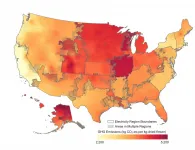(Press-News.org) It's no secret that the United States' $13 billion cannabis industry is big business. Less obvious to many is the environmental toll this booming business is taking, in the form of greenhouse gas emissions from commercial, mostly indoor production.
A new study by Colorado State University researchers provides the most detailed accounting to date of the industry's carbon footprint, a sum around which there is only limited understanding. What is clear, though, is that consumer demand for cannabis is insatiable and shows no signs of stopping as more states sign on to legalization.
The study, published in Nature Sustainability, was led by graduate student Hailey Summers, whose advisor, Jason Quinn, is an associate professor in the Department of Mechanical Engineering. Summers, Quinn and Evan Sproul, a research scientist in mechanical engineering, performed a life-cycle assessment of indoor cannabis operations across the U.S., analyzing the energy and materials required to grow the product, and tallying corresponding greenhouse gas emissions.
They found that greenhouse gas emissions from cannabis production are largely attributed to electricity production and natural gas consumption from indoor environmental controls, high-intensity grow lights, and supplies of carbon dioxide for accelerated plant growth.
"We knew the emissions were going to be large, but because they hadn't been fully quantified previously, we identified this as a big research opportunity space," Summers said. "We just wanted to run with it."
The CSU group's efforts update previous work by Lawrence Berkeley National Laboratory researchers, which quantified small-scale grow operations in California and predated the cascade of state-by-state legalization since Colorado was first to legalize in 2012. To date, 36 states have legalized medical use of cannabis, and 15 have legalized recreational use.
Mapping variable emissions
The CSU team surmised there would be substantial variability in emissions depending on where the product was being grown, due to climate as well as electric grid emissions. Their recently published work captures the potential cross-country spread of large commercial warehouses for growing cannabis, and it models emissions for several high-growth locations around the country. Their results include a map that shows relative emissions anywhere in the U.S., as defined as emissions per kilogram of cannabis flower. They've also developed a GIS map that allows users to enter a county name and find local emissions estimates.
Their research shows that U.S. indoor cannabis cultivation results in life-cycle greenhouse gas emissions of between 2,283 and 5,184 kilograms of carbon dioxide per kilogram of dried flower. Compare that to emissions from electricity use in outdoor and greenhouse cannabis growth, which is 22.7 and 326.6 kilograms of carbon dioxide, respectively, according to the New Frontier Data 2018 Cannabis Energy Report. Those outdoor and greenhouse numbers only consider electricity, while the CSU researchers' estimate is more comprehensive, but the comparison still highlights the enormously larger footprint of indoor grow operations.
The researchers were surprised to find that heating, ventilation and air conditioning systems held the largest energy demand, with numbers fluctuating depending on the local climate - whether in Florida, which requires excessive dehumidifying, or Colorado, where heating is more important.
The high energy consumption of cannabis is due in part to how the product is regulated, Quinn said. In Colorado, many grow operations are required to be in close proximity to retail storefronts, and this has caused an explosion of energy-hungry indoor warehouses in urban areas like Denver. According to a report from the Denver Department of Public Health and Environment, electricity use from cannabis cultivation and other products grew from 1% to 4% of Denver's total electricity consumption between 2013 and 2018.
The team is seeking more funding for continuing their modeling work, with hopes of extending it to a comparison between indoor and potential outdoor growth operations. Ultimately, they would like to help the industry tackle environmental concerns while legal cannabis is still relatively new in the U.S.
"We would like to try and improve environmental impacts before they have become built into the way of doing business," Sproul said.
INFORMATION:
The economic benefits of conserving or restoring natural sites "outweigh" the profit potential of converting them for intensive human use, according to the largest-ever study comparing the value of protecting nature at particular locations with that of exploiting it.
A research team led by the University of Cambridge and the Royal Society for the Protection of Birds (RSPB) analysed dozens of sites - from Kenya to Fiji and China to the UK - across six continents. A previous breakthrough study in 2002 only had information for five sites.
The findings, published in the journal Nature Sustainability, come just weeks after a landmark report by Cambridge Professor Partha Dasgupta called for the value of biodiversity to be placed at the heart of global economics.
For the latest ...
Coastal populations are experiencing relative sea-level rise up to four times faster than the global average - according to new research from the University of East Anglia.
A new study published today in Nature Climate Change is the first to analyse global sea-level rise combined with measurements of sinking land.
The impact of subsidence combined with sea-level rise has until now been considered a local issue rather than a global one.
But the new study shows that coastal inhabitants are living with an average sea level rise of 7.8 mm - 9.9 mm per year over the past twenty years, compared with a global average rise of 2.6mm a year.
And the impacts are far larger than the global numbers reported ...
LA JOLLA--(March 8, 2021) Deep learning is a potential tool for scientists to glean more detail from low-resolution images in microscopy, but it's often difficult to gather enough baseline data to train computers in the process. Now, a new method developed by scientists at the Salk Institute could make the technology more accessible--by taking high-resolution images, and artificially degrading them.
The new tool, which the researchers call a "crappifier," could make it significantly easier for scientists to get detailed images of cells or cellular structures that have previously been difficult to observe because they require low-light conditions, such as mitochondria, which can ...
What The Study Did: Researchers assessed the number of hospital admissions for noncommunicable diseases (abnormal tissue growths, metabolic diseases, cardiovascular diseases and musculoskeletal diseases) in São Paulo, Brazil, between January and June last year compared with the corresponding periods in the previous three years.
Authors: Fernando Adami, Ph.D., of the Laboratório de Epidemiologia e Análise de Dados, Centro Universitário Saúde ABC in São Paulo, Brazil, is the corresponding author.
To access the embargoed study: Visit our For The Media website at this link https://media.jamanetwork.com/
(doi:10.1001/jamanetworkopen.2021.0799)
Editor's Note: Please ...
Menlo Park, Calif. -- Scientists have taken a major step forward in harnessing machine learning to accelerate the design for better batteries: Instead of using it just to speed up scientific analysis by looking for patterns in data, as researchers generally do, they combined it with knowledge gained from experiments and equations guided by physics to discover and explain a process that shortens the lifetimes of fast-charging lithium-ion batteries.
It was the first time this approach, known as "scientific machine learning," has been applied to battery cycling, said Will Chueh, an associate ...
Hamilton, ON (March 8, 2021) - Many parents know the struggle of having to make children with pneumonia finish the usual 10-day course in antibiotics despite the child feeling better after a few days of medication.
New research from McMaster University has proven that a five-day course of high-dose amoxicillin will do just as well for children six months to 10 years old with common pneumonia.
"Several studies have proven that adults with pneumonia do fine with short courses of antibiotics, and now we have proved a short course of antibiotics also works for children," said Dr. Jeffrey ...
A study from North Carolina State University found outdoor play and nature-based activities helped buffer some of the negative mental health impacts of the COVID-19 pandemic for adolescents.
Researchers said the findings, published in the International Journal of Environmental Research and Public Health, point to outdoor play and nature-based activities as a tool to help teenagers cope with major stressors like the COVID-19 pandemic, as well as future natural disasters and other global stressors. Researchers also underscore the mental health implications of restricting outdoor recreation opportunities for adolescents, and the need to increase ...
DALLAS - March 8, 2021 - A new type of CAR T-cell therapy more than triples the expected length of remission for multiple myeloma patients who have relapsed several times, according to an international clinical trial with UT Southwestern as the lead enrolling site.
Results of the trial, published recently in the New England Journal of Medicine, were significantly better than those seen with other therapies available to heavily relapsed and refractory myeloma patients who had already received the three main classes of treatment. Nearly three-quarters of the patients had at least a partial response to the therapy. About a third achieved a complete remission, with the disappearance of all traces of cancer.
Median time without the disease worsening was 8.8 months with this new ...
A woman grips her purse tightly as you approach. A store manager follows you because you look "suspicious." You enter a high-end restaurant, and the staff assume you're applying for a job. You're called on in work meetings only when they're talking about diversity.
The indignities and humiliations Black men -- even those who have "made it" -- regularly endure have long been seen as part and parcel of life in the United States among the Black community, a sort of "Black tax" that takes a heavy toll on physical and mental health.
Now, a new UCLA-led study reveals these "hidden costs" of being Black in America. ...
FAYETTEVILLE, Ark. - Moral outrage is an attractive behavior, particularly to people seeking long-term relationships, according to a new paper by researchers including a University of Arkansas psychologist.
The work indicates that people who displayed moral outrage were considered more benevolent and trustworthy than a control person not displaying outrage, and therefore more likely to possess other prosocial behaviors that would benefit a long-term relationship. There was a catch, however: Researchers found that people had to take action to address the moral wrong in question and not just talk about ...



